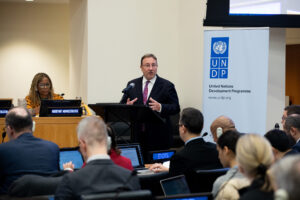THE NEWS: What Happened
A Nigerian nonprofit technology organization building digital infrastructure for the care economy has been selected for the 2025 Morgan Stanley Inclusive & Sustainable Ventures, a global innovation lab spotlighting companies driving systemic social impact. Caring Africa represents the sole African selection in Morgan Stanley’s prestigious program, highlighting the continent’s emerging leadership in developing technology solutions for underserved social sectors.
The organization, led by chief executive Adesiyan, operates through its flagship platform “Caring Blocks,” which functions as “a care infrastructure-as-a-service platform” that goes beyond “aggregating care providers” to build “the rails through identity verification, smart matching, contracts, compliance” for Africa’s fragmented care sector. The selection reflects growing institutional recognition that African technology companies are addressing fundamental infrastructure gaps that create scalable social and economic impact.
Morgan Stanley’s Inclusive & Sustainable Ventures program represents one of Wall Street’s most selective social impact initiatives, typically featuring companies that demonstrate both meaningful social outcomes and sustainable business models. Caring Africa’s inclusion suggests the investment banking giant views African care economy solutions as strategically important for global social infrastructure development, particularly as demographic shifts increase care demand worldwide.
THE INTELLIGENCE: What It Means
This selection signals a fundamental shift in how global financial institutions view African technology innovation. Rather than viewing the continent primarily as a recipient of development aid or basic technology adaptation, Morgan Stanley’s choice of Caring Africa as the sole African participant indicates recognition that African companies are developing cutting-edge solutions to problems that affect developed and developing markets alike.
The care economy represents one of the fastest-growing sectors globally, driven by aging populations in developed countries and urbanization in emerging markets. However, care services remain largely informal, unregulated, and inefficient across most geographies. Caring Africa’s infrastructure-as-a-service approach addresses systemic market failures that traditional technology companies have struggled to solve, suggesting African innovation may lead global care economy digitization rather than follow Western models.
The timing appears particularly strategic for care economy investments. Post-pandemic recognition of essential workers, combined with demographic trends showing increased care needs across all income levels, has created unprecedented policy attention and funding availability for care infrastructure solutions. Companies that establish early leadership in care economy digitization may capture significant value as governments and corporations increase spending on care sector formalization.
The nonprofit structure presents both advantages and limitations for scaling impact. While nonprofit status may facilitate government partnerships and regulatory acceptance in sensitive care sectors, it could constrain traditional venture capital involvement and limit rapid international expansion. However, Morgan Stanley’s involvement suggests hybrid models combining social impact with sustainable revenue generation may attract institutional capital previously unavailable to pure nonprofit organizations.
The “infrastructure-as-a-service” positioning indicates sophisticated understanding of platform economics and network effects. Rather than competing directly with individual care providers, Caring Africa is building foundational systems that enable the entire sector to operate more efficiently. This approach creates natural monopoly characteristics and switching costs that may prove more defensible than consumer-facing care applications vulnerable to platform disintermediation.
The focus on “identity verification, smart matching, contracts, compliance” addresses regulatory and trust challenges that have constrained care economy growth across emerging markets. These capabilities suggest Caring Africa has developed expertise in areas where traditional technology companies face significant barriers, particularly in markets where informal care arrangements predominate and regulatory frameworks remain underdeveloped.
THE BRIDGE: What To Do About It
For impact investors and socially-focused venture capitalists, Caring Africa’s Morgan Stanley selection highlights investment themes that combine meaningful social outcomes with scalable business models. The most compelling opportunities appear to be companies addressing fundamental infrastructure gaps in essential services sectors, particularly those developing platform solutions that enable entire industries rather than competing with individual service providers.
Similar opportunities warranting investigation:
- Healthcare infrastructure platforms: African companies building foundational systems for medical service delivery, particularly those addressing provider verification, patient matching, and regulatory compliance in underserved markets
- Education technology infrastructure: Platforms enabling rather than replacing educational institutions, especially those focused on teacher training, curriculum management, or student progress tracking in emerging market contexts
- Agricultural supply chain platforms: Companies building infrastructure for smallholder farmer integration into formal markets, particularly those addressing quality verification, logistics coordination, and financial inclusion
Active investors in African social impact technology:
- Morgan Stanley: Now demonstrated commitment to African infrastructure solutions with global application potential, likely seeking similar platform-based approaches to essential services
- Gates Foundation: Historically active in African care and health infrastructure with recent focus on technology-enabled scaling of social services
- Google.org: Significant investment in African nonprofits developing technology solutions for social challenges, particularly those with potential for international replication
- Omidyar Network: Focus on emerging market infrastructure with emphasis on companies creating economic opportunity for underserved populations
For founders addressing social infrastructure challenges in Africa, Caring Africa’s approach provides strategic guidance about building sustainable organizations that attract institutional attention from global financial institutions. The key insight involves positioning technology solutions as infrastructure enablement rather than direct service provision, creating platform effects that benefit entire sectors while generating sustainable revenue streams.
The nonprofit structure selection deserves careful consideration for social impact companies seeking both mission alignment and growth capital. While traditional venture capital may prefer for-profit structures, institutional investors increasingly recognize that certain social infrastructure challenges require hybrid models combining mission-driven governance with business sustainability. The Morgan Stanley selection suggests sophisticated institutional investors can evaluate social impact companies using criteria beyond pure financial returns.
International expansion strategies should consider the regulatory and cultural complexity of care services across different markets. Caring Africa’s focus on compliance and verification systems suggests successful care economy platforms must address local regulatory requirements rather than assuming technology solutions can transcend policy frameworks. This creates opportunities for companies with deep regulatory expertise and government relationship capabilities.
Corporate partnership opportunities exist for multinational companies seeking social impact positioning and emerging market entry strategies. Care economy infrastructure platforms may provide established corporations with authentic social impact narratives while offering distribution channels and local market knowledge for products and services targeting underserved populations.








